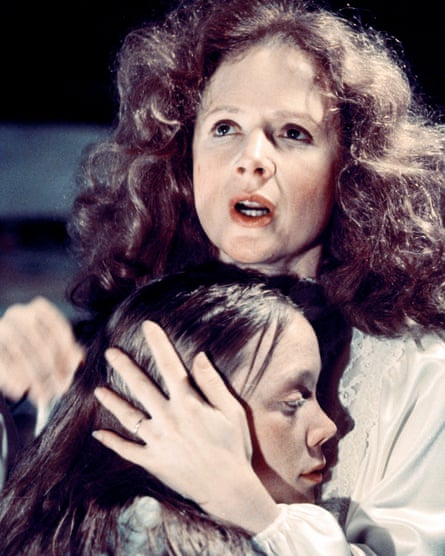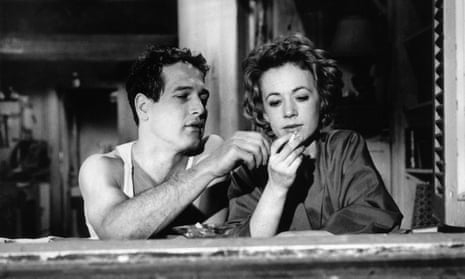For those who remembered Piper Laurie from her days as a contract player in a series of formulaic escapist pictures made by Universal Studios in the 1950s, it was hard to believe that the lonely young woman in Robert Rossen’s The Hustler (1961), who takes her own life when she is rejected by the pool shark Paul Newman, was one and the same. This Oscar-nominated performance was a surprise, and nothing Laurie did before or after touched it.
Having proved that she could act, Laurie, who has died aged 91, immediately retired from the cinema. She returned 15 years later, in another guise, this time specialising in playing harridans, principally in horror movies. The most celebrated was Brian De Palma’s repulsive and compulsive Carrie (1976), for which she was also Oscar-nominated, this time as the religious mother of the pubescent Sissy Spacek, intoning “the first sin was intercourse”.
A third nomination came for another of her serious portrayals, as the estranged mother of the young deaf woman (Marlee Matlin) in Randa Haines’s Children of a Lesser God (1986).
Born Rosetta Jacobs in Detroit, Michigan, she was the daughter of Charlotte (nee Alperin) and Alfred Jacobs, a furniture dealer. Her mother’s parents had come from Russia and her father’s from Poland.
In 1938 the family moved to Los Angeles, and Rosetta spent three years looking after a sister with health problems in a sanatorium, an experience that made her both imaginative and self-sufficient. After attending Hebrew school and weekly elocution and drama lessons, at the age of 18 she signed a contract with Universal Studios and changed her name.

Laurie made her screen debut as Ronald Reagan’s teenage daughter in the charming Louisa (1950), about a grandmother’s romances.
In her 2011 memoir Learning to Live Out Loud, Laurie said that her first affair was with Reagan, then between wives. After appearing as Donald O’Connor’s wholesome girlfriend in both The Milkman (1950) and Francis Goes to the Races (1951), Laurie made her name playing Baghdad princesses in the rather vapid Technicolor Arabian Nights adventures The Prince Who Was a Thief (1951) and Son of Ali Baba (1952), both with Tony Curtis, and The Golden Blade (1953), with Rock Hudson.
In order to enhance Laurie’s image, Universal announced that she bathed in milk and ate flower petals to protect her skin. It did not do her box-office appeal any harm, and she and Curtis made a likable team once more, in No Room for the Groom (1952), where they are thwarted from consummating their marriage, and Johnny Dark (1954), involving racing cars.
Laurie was reunited with Hudson in Douglas Sirk’s Has Anybody Seen My Gal (1955), set in the 20s, in which she as a flapper and he as a soda jerk – dispensing drinks in a drug store – got to dance the Charleston together. Laurie continued portraying gutsy gals in two pleasant-enough westerns: as a saloon singer in Dawn at Socorro (1954), with Rory Calhoun; and as the only female in Smoke Signal (1955), starring Dana Andrews, but most of her roles gave her little satisfaction.
The last straw came when Laurie played second fiddle to a performing dog in Kelly and Me (1956). Though she was earning $2,000 a week, she demanded that the studio bosses give her better parts. “But they didn’t know what I was talking about,” she recalled. “I told my agent, ‘They can throw me in jail, sue me, I don’t care what it is. I’m never working again until I can do something that I have some respect for.’”
On quitting Universal, she made one film for MGM – Until They Sail (1957), a second world war melodrama that gave Laurie her first meaty role as a New Zealand woman (no accent attempted) who has an affair while her oafish husband is away at war, and suffers the consequences.
In 1958, Laurie moved to New York, where she appeared in a number of challenging television roles including The Days of Wine and Roses, a powerfully acted show recorded live, in which she and Cliff Robertson played an alcoholic couple. According to one critic, “Miss Laurie turned in a performance that had depth, honesty and something else, something that I guess could be called glow.”
Her return to the big screen after four years came with The Hustler, in which she brilliantly captured her character’s poignant self-destructiveness, scrawling “Perverted, Twisted, Crippled” on the mirror as her final message. Despite the movie pointing to new possibilities for her, she married the film critic Joseph Morgenstern, retreated to Woodstock, New York state, and then accepted only occasional TV and theatre work, but taking no film roles.
“I gradually gave up acting,” she said. “I started to lose interest. Lots of things were happening in the world, such as the Vietnam war. I just thought it was a really silly way for a grown-up to spend her time.”
One of her rare parts during her semi-retirement was as Laura Wingfield in a revival of Tennessee Williams’ The Glass Menagerie on Broadway for five months in 1965. Eventually she returned to Hollywood as the monstrous mother in Carrie, which launched the third phase in her career, continuing the shock treatment in Ruby (1977), as a former gangster’s moll haunted by her dead lover.

Laurie found these roles “a hoot. I’d do these grotesque, horrible things, and in between takes I’d laugh. It was wonderful to get all that stuff out, like childhood play-acting.”
She was kept busy on television throughout the 80s and 90s, notably in the mini-series The Thorn Birds (1983), set in Australia and filmed in California, and as the kinky, conniving mill owner Catherine Martell in David Lynch’s Twin Peaks (1990-91). “There’s a mystique about her,” explained Lynch. “She has kind of a wild streak that’s interesting because it could become dangerous.”
Laurie showed her virtuosity by also playing a Japanese businessman in the series, which was kept a secret from the rest of the cast, who did not recognise her under the heavy makeup.
In between film and TV projects, she toured in a one-woman stage show as Zelda Fitzgerald in The Last Flapper (1987).
She later reunited with Spacek for The Grass Harp (1995), based on Truman Capote’s novel, and appeared in two more horror movies, The Faculty (1998) and Bad Blood (2012). The TV guest work continued and in her final films she played grandmothers – one with secrets in Snapshots, and another to an FBI informant in White Boy Rick (both 2018).
Her marriage ended in divorce in 1982. She is survived by her daughter, Anne Grace.
Piper Laurie (Rosetta Jacobs), actor, born 22 January 1932; died 14 October 2023

Comments (…)
Sign in or create your Guardian account to join the discussion